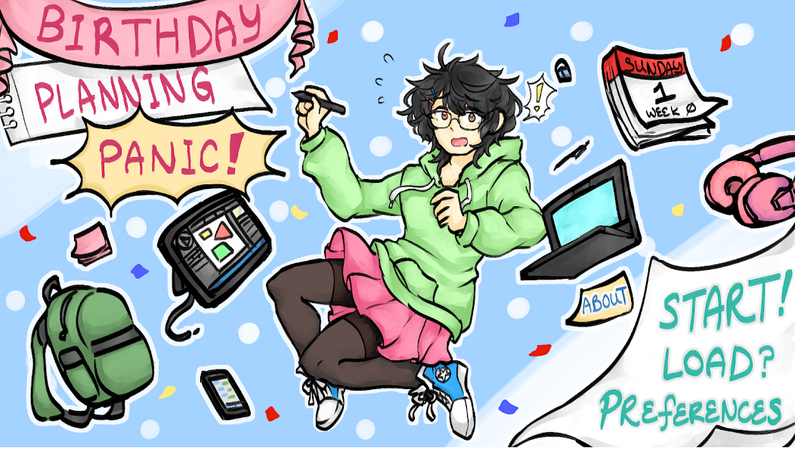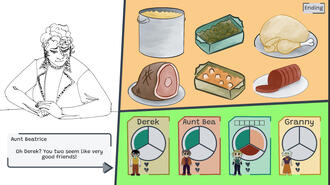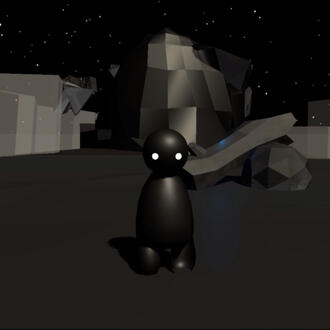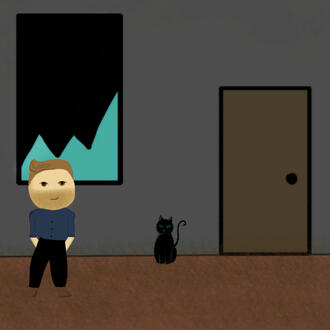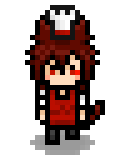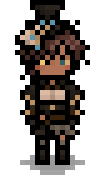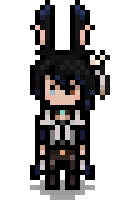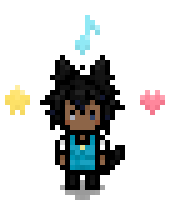Welcome!
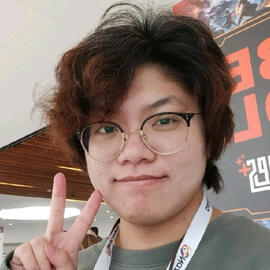
Skye Guan
Academic | Educator | Game Dev | Artist
About
Hey there!
I'm Zu Er "Skye" Guan, and I'm a games-focused
academic researcher, educator, and game developer.As a game dev, I specialize in game (systems) design, project management, narrative design, & character art. I'm also a programmer, and I'm the most comfortable with Unity (C#), Ren'Py (Python), and RPG Maker MZ (JavaScript).As an academic, my field of study is in games and how they both influence and are influenced by the people that play and make them. BA Game Studies from CUNY Baccalaureate for Unique and Interdisciplinary Studies & MA in Game Design from Lindenwood University.My Master's Thesis was on Player-to-Player Character Relationships in MMORPGs, positing & defining the utilitarian and self-representational distinction in types of player-PC relationships through player purpose & avatar identification. This study involved conducting a survey and data analysis of the resulting 287 valid responses through intersectional, interdisciplinary, and both qualitative and quantitative analysis.A proud member of the 2023-2024 & 2024-2025 Gay Gaming Professionals Scholar Cohort!
Love you guys <3!I'm currently the PD Instructor at the EGD Collective in charge of the Professional Development curriculum and the Exploration Game Studio Program, teaching mostly undergraduate college students soft skills, communication skills, production, project management, and fundamental game design and development skills and workflows.I am also the Project Manager, Game Designer, & Programmer at Team Robo, an indie studio known for their first game, Tomorrow Will Be Dying.
My favorite games include Baldur's Gate 3, Final Fantasy XIV, Rimworld, Stardew Valley, Old School RuneScape, League of Legends, and Overcooked! 2.Fun fact! My cat's name is Pudding, and my dogs' names are Mango & July!
Contact
Get in touch with me by Discord, Email, or LinkedIn!
Discord @sk_pyu
[email protected] - Main Contact
[email protected] - Art Commissions & Game Dev Inquiries
LinkedIn @ skyeguan
PORTFOLIO
Games I've Made & Worked On!
Digital Character Art
Pixel Character Art!
Code Samples & Github Repos
Birthday Planning Panic!
Basic info
Birthday Planning Panic! is a Management Sim/Visual Novel where you must manage your HP, MP, Stress, and funds while planning the perfect birthday party for your twin sister!Synopsis: You’ve been put in charge of planning a birthday party for your (twin) sister this year! You’ve always been the more organized and de facto event planner of your family, but this time it’s gotta be big because it’s her big 20th! Only problem is, it’s one month away, you still have school, and she didn’t give you much to work with for party funds! Will you be able to throw her the best party ever, all while juggling your full-time undergraduate career, your health, and a limited budget all within 30 days?$2k Grand Prize winner & solo developed for Diversify 2023, the Android game jam hosted by Gay Gaming Professionals from Nov 3rd, 2023 ~ Dec 3rd, 2023.
Now available on Google Play Store for Android, and for PC, Linux, & Mac on itch.io.Theme: Celebrate!
Development process
Core Game concept
Since the theme of the game jam was revealed to be Celebrate, I started as always by brainstorming core game concepts that would centralize the theme through both story and gameplay as much as possible. I try to avoid superficial game design where the integration of a theme is simply a reskin and based solely in assets rather than designed for the theme.When thinking of celebration, the first thing that comes to mind for me is birthdays---the celebration of the day of one's birth, and thus, their whole life. As I have event planning & project management experience, I thought making a management sim would be an interesting and thematic integration, as birthdays tend to be used in stories as either a setting for plot progression, or as an event objective where characters plan a party (often as a surprise).Since mental health and self-esteem issues is something I have studied and experience in, I wanted to tie in a message of celebrating everyone, and remembering to not only celebrate those that you love, but also yourself. Many have grown up being put into the role of caretaker or similar due to their disposition for certain things, be it emotional labor or planning skills. This formed the core of the plot, alongside the not-so-subtle plot twist that the birthday party was never meant to be only for your sister---you're twins, you're supposed to be celebrating yourself, too.
Narative & Game Design
Following that, the win condition is not actually to throw a "successful" birthday party, as there are no material measurements of success, only dialogue and visual reflections of your choices during event planning. Instead, there is only a lose condition--that is, when the player accumulates more than 100 Stress, accrued by failing to take care of oneself (negative HP/MP) and also failing to satisfy event planning requirements for each event goal (achieving Booking stage).Though there is no win condition based on party planning success (a subjective measurement anyway, as your sister does not care about how extravagant the party is, only about you), I did not want the event planning to be without substance. It causes stress because the protagonist bases her self-worth on her performance, and thus the true objective of the game is in the actual gameplay management of one's Stress, influenced by HP, MP, Time, and Money, all affected by Actions & date progression.
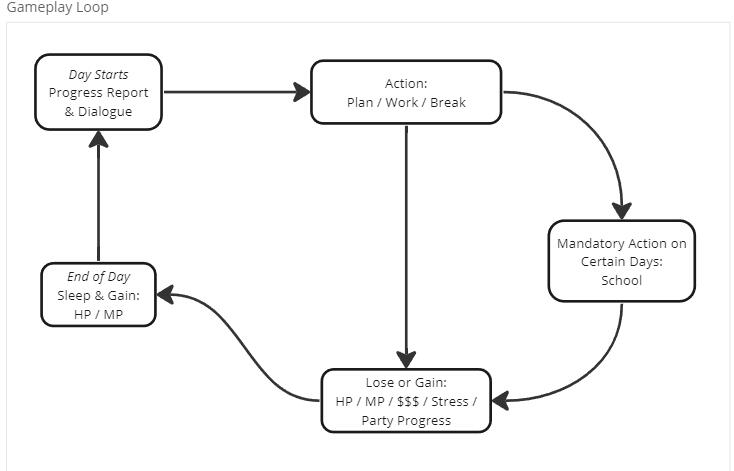
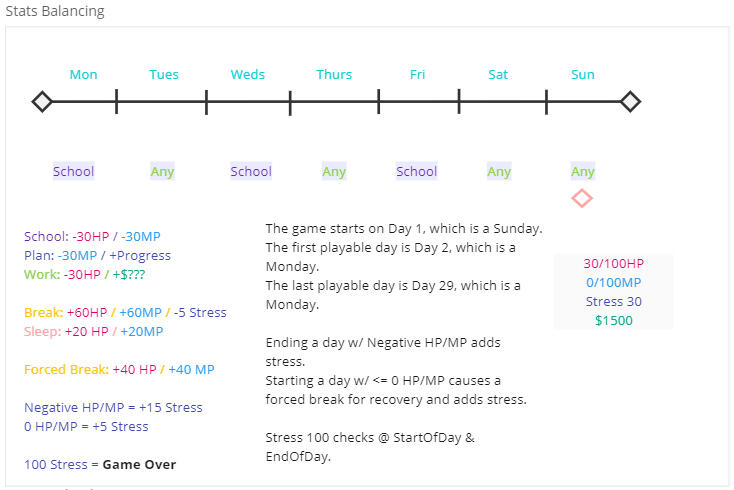
As seen above, while the core gameplay loop is relatively simple, the balancing of the schedule and stats is the most important part of a resource management game (a.k.a. management simulator).
I had to decide on the intended difficulty level first, and if plot progression was more important than actual gameplay difficulty.
Ultimately, I decided that since I didn't have the time to design & implement truly complex management systems, I chose an easy difficulty to start with, prioritizing the narrative message I wanted to send while still providing value to each resource including money and actual party planning
--even if the twist is that the party goals aren't the true objective of the game story-wise.The game only rewards (incentivizes) players for somehow maximizing their time and booking the most expensive options of each event goal with minor visual and dialogue changes, if they wish to challenge themselves on replays.
Designing OBjectives - "Event Goals"
Each week the player has one event goal to Plan, with four playable weeks totalling to four event goals: [Venue, Guests & Invites, Cake, and Decorations]. Effectively, the player only gets one week to use the Plan action and progress planning each event goal.
Tip: Taking a [Break] refills HP/MP nearly to full, and is crucial to maintaining Stress while satisfactorily Planning. The game unsubtly hints this to you at the start, as Jessie reminds the player to take breaks and take care of their health above all.Funds are limited, and realistically from my experience, the [Venue] is always the first thing one should secure when planning an event, and is almost always the most expensive out of the gate. This means that the first time the player encounters a cost, depending on their approach, it may be necessary to [Work], spending Time & HP to be able to afford the other three event goals if the player is overzealous.Initially, I wanted to approach the event planning progression via. percentages, showing the player where they're at compared to maximum planning progression (at 80%, you know it's a "passing" grade and only extra details will come from further Planning). This would've required either randomizing progress slightly every Plan action, or setting each Plan action enacted to provide a specific amount of % progress.
However, I realized that there wouldn't be enough time to incorporate RNG into the game design as it would affect planning for the rest of the week and also how I could anticipate the player to act and progress, which meant more work within my limited timeframe. I ended up just using stages or phases for Event Goal Planning to indicate progress via. dialogue and gameplay options, as the addition of progress displayed in percentages for player perception/information would not be as beneficial as the time cost to design and implement it for each event goal.
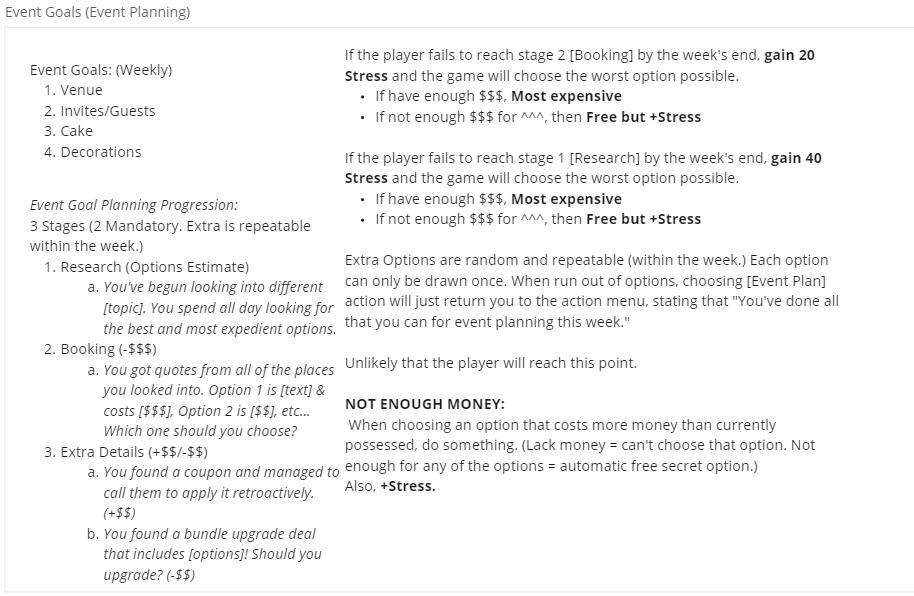
Programming
As this was a game jam with limited time and I was actually preoccupied with both midterms & finals throughout the majority of the month, I didn't want to learn an entirely new engine/program.
I still wanted to practice coding, however, so making a management simulator game where resource management is central to the gameplay in Ren'Py, a Visual Novel engine, sounded interesting due to the interactive nature of each resource and player Action by design, while also being doable, given my past experience working in Ren'Py.I avoided hardcoding anything at all costs, and wanted to make the game both scalable and most importantly, easily adjustable for balancing, so I focused on making variables, sets, and functions to keep my code clean. (I actually ended up building a habit of commenting more meticulously than "strictly necessary" due to the amount of functions made and used, as their purposes would usually be more multifunctional than simply their label name alone can communicate.)
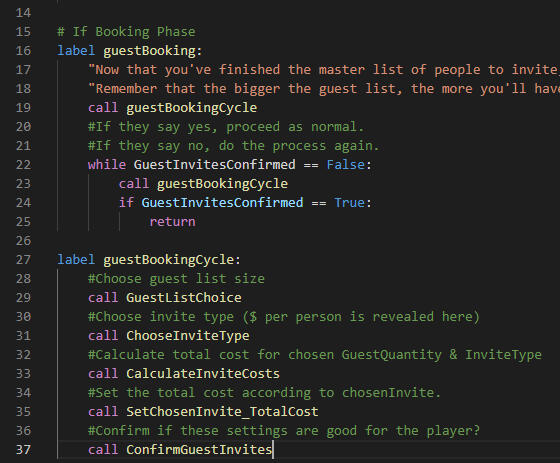
The Guests & Invites event goal actually ended up being the most complex system to implement, as I wanted the player to be able to choose both guest quantity and type of invites, as invite costs were per person and thus scaled based on the size of your guest list. Thus, it would be frustrating if the player had chosen the guest list size (and thus guest quantity) in a separate instance and was locked into choosing between invite types with little flexibility in choice. This is an instance where a player might think, "if only I could just change the number of guests instead, then I could afford this option and still have enough left over for the other two event goals!"Beyond realism, I felt that the player experience would be inhibited if I had simplified the system such that the guest list size was set in stone prior, and they only had to choose between total costs (and thus only two variables to call upon). As a result, this section was the most bug-prone due to looping until the player confirmed their selection, but I'm quite happy with its implementation, and the flexibility in decision-making that it affords the player.
Programming - Action Menu
I used Imagemapping in Ren'Py to build the Action Menu such that the player would be able to tap on the options on the screen directly, to be distinct from regular dialogue-based player choices.Below is a snapshot of my code for the Action Menu, plus a picture of it in-game during development, using placeholders. [School] is not an option despite technically being an Action, due to being an automatic and mandatory event that occurs on certain days rather than a player choice.
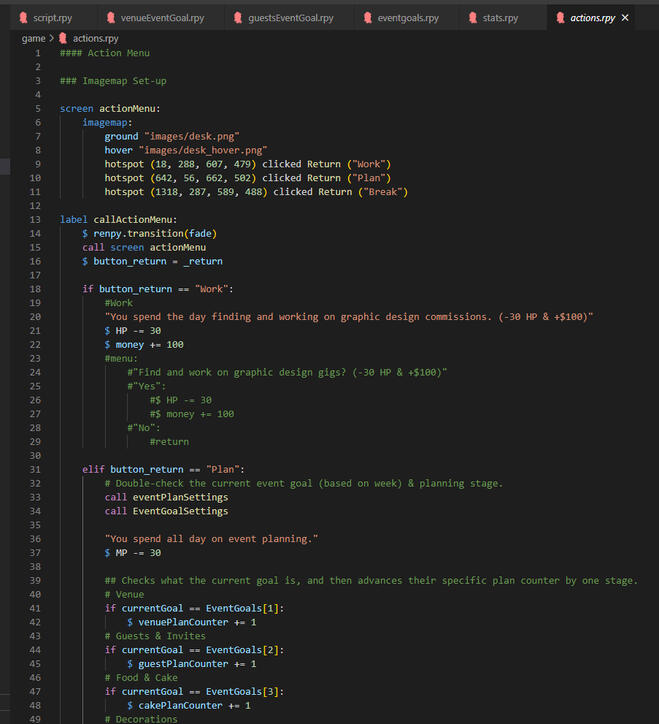
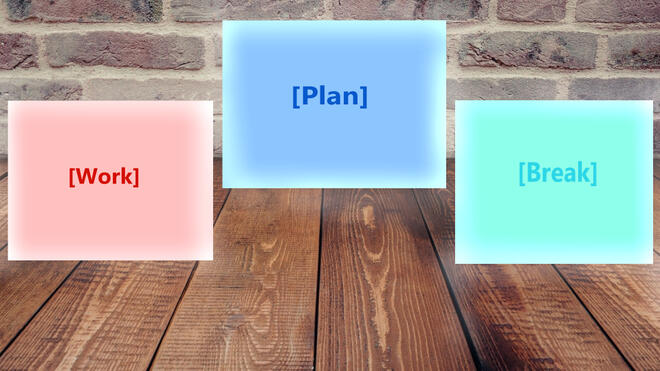
Birthday Planning Panic!
Privacy policy
This game does not collect any user or device data.No data will be shared with third parties.This game does not use any user or device data.
Deadwood
Basic Info
A 2D Adventure Mystery game made in 2 months, for the course GAM 50001 Team Studio 1 @ Lindenwood University.Synopsis: The player is a professional investigator summoned to the remote town of Deadwood to look into a string of inexplicable disappearances. Deadwood is a small, close-knit town hidden behind an eerie and ominous forest. According to Deadwood residents, a malevolent witch makes their home in the woods and despises trespassers of all kinds. For this reason, many refuse to venture into the forest, but they do believe the terrifying witch is behind the missing townspeople. Through exploration, it is up to the player to discover what happened to the missing people and unravel the mysteries of the witch and Deadwood.I was the programmer and designer for Deadwood, and also led the team as the graduate student of the group comprised of undergraduate students in the adjoined BA Game Design program. I guided the team through overall direction, documentation, and gave advice on workflow as well as managing the scope and budget of the project.Made in collaboration with these artists, writers, and designers:
Kale Stone, Larnell Brouse, Maddie Knemeyer Lynch, Sean Cloutier, and Ty Flynn.
Whispers in Wraithwood Estate
Basic Info
A 3D Mystery game made in 2 months, for the course GAM52400 Team Studio 2 @ Lindenwood University over the course of eight weeks.Synopsis: A mysterious group of monsters check in for their gathering at the Manor, unbeknownst to all
that the night will take a sinister turn as a fellow employer is murdered by one of the group. As
the receptionist, you must uncover the murder before you become the next victim and are
doomed to relive the night again. Investigate the manor, solve puzzles, and discover the murderer
to free yourself from the time loop.I was the interdisciplinary project manager, producer, programmer, systems & UI designer, and environment concept artist & character designer for Deadwood, and led the group as the graduate student of the 18-person team comprised of undergraduate students in the adjoined BA Game Design program. I ran the team through trainings, led the project management team, and provided direct guidance on creative vision & direction, documentation, game development workflow & communication pipelines, scope, budget, and task/role distribution.
Master's Thesis
A research study on player-to-avatar relationships conducted over the course of two years of coursework during the pursuit of a Master's in Game Design degree at Lindenwood University. Existing scholarship in the fields of psychology, feminist theory, queer theory, and game studies were used in the development of an online survey administered to 287 participants and analyzed through an intersectional lens using a combination of qualitative and quantitative analytical methodologies.Abstract: This thesis studies the relationships between video game players and their player characters, the characters that they control, through the lens of player purpose and intent by conducting research using an online survey developed and analyzed using an interdisciplinary methodology based on existing studies in the field regarding avatar identification, player psychology, and queer and feminist theory. This thesis posits that are two types of player relationships with their player characters based on player intent—player characters as the personal avatar and representation of the self, and player characters as a tool for the execution of player control and gameplay experience. This persists even in games where players are incentivized to view their player characters as avatars of the self rather than for utility alone such as Massively Multiplayer Online Roleplaying Games (MMORPGs) that often feature deep character customization and frame the player's character as central to the story or experience. This study was conducted on players of the game Final Fantasy XIV (FFXIV) by Square Enix, chosen for both its status as one of the most popular and active MMORPGs in the market and its game design philosophy that focuses on providing a good standalone RPG experience, thus especially centralizing the player character in both story and gameplay experience compared to most MMORPGs. The aim of this thesis is to study what factors influence player preferences or choices towards utilitarian and self-representational player-to-player character types of relationships within an environment such as an MMORPG in which players are heavily incentivized towards self-representation. Furthermore, this thesis aims to establish the utilitarian and self-representational type distinction based on player purpose towards player characters to further the field of study on player-to-player character relationships by providing the language and determination method for this previously unexplored angle of study on player values in their relationships with their player characters in MMORPGs.
